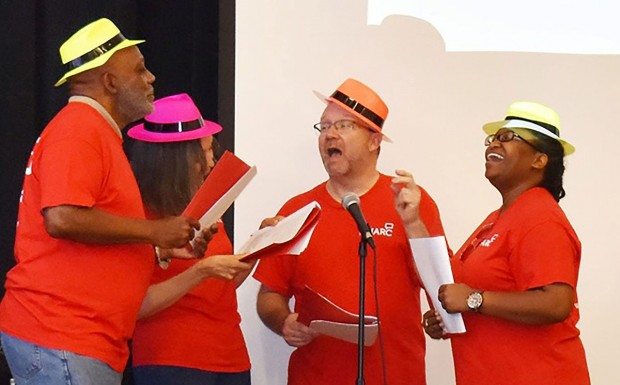Name That Tune: Tom Pickett

This week’s Name That Tune is brought to you by Tom Pickett, a member of Houston Aphasia Recovery Center's Choir, the HARC Heralds. After suffering a stroke three years ago, Tom was left with aphasia, the sudden loss of language. Read on for excerpts from our interview with singer and soloist Tom, his caretaker Brian Brown, and HARC's director Eleni Christou. Watch HARC Heralds' video to see if you can Name That Tune.
Could you give me some background on aphasia?
Brian: Aphasia is the loss of language, but not the loss of intellect. For Tom, everything is still there. Everything he has ever known and ever learned is still inside his brain. The ability to get it out or comprehend what is coming in becomes the challenge. One analogy we like to use it the example of filing cabinets. Your whole life, you’ve filed things away in filing cabinets in your brain. And when the stroke happened, someone went in and tossed the folders everywhere. When he wants to communicate, he has to gather together his thoughts before he can communicate. In addition, he may say the associated word instead of what he really means. When communicating, the goal isn’t to get it perfectly correct. It’s to get the thought communicated.
How did you get involved in HARC Heralds?
Tom: I started singing at Memorial Junior High and at church. In 2018, I first sang with the HARC program during June Aphasia Awareness month.
How long have you been singing?
Tom: Since junior high and I sing all the time.
What kind of music does the group rehearse and perform?
Tom: Christmas songs, popular music, country, oldies, jazz, soul. And this year, we are practicing Randy Travis songs.
How has your involvement in the HARC Heralds influenced you?
Tom: I like the music and songs. Singing makes me feel good.
Could you tell me a little bit about HARC?
Tom: Before the pandemic, we met in groups for programs such as: Where in the World, Book Club, Language Games, Puzzles, Numbers, and In the News. We also had lunch together. There were social activities such as going to Astros games, Bingo night, and the Arboretum. Now, we meet on Zoom.
What kind of music do you like? Favorite artist or group?
Tom: I like the Beatles, Dolly Parton, the Bee Gees, Abba, and Randy Travis, of course!
Why is a choir a part of your programming at HARC?
Eleni: People with aphasia almost always have the injury on the left side of the brain, while on the right side of the brain is where you produce music. In Tom’s case, he can speak in complete sentences and communicate full thoughts. Others who can only speak a few words can often sing a full line of a song. So what we focus on at HARC is not that everyone sounds beautiful. It’s more about the forming of the words and producing sound. Not every word comes out from everyone. But we celebrate that the sound comes out. For some participants, singing in the HARC Heralds was the first time their family heard them form a full sentence since their stroke! We celebrate these moments!
Editor's note: HARC is a non-profit wellness center for persons with aphasia. They offer various language-based programs which provide opportunities for participants to further their language recovery in a supportive environment.
Want more buzz like this? Sign up for our Morning Buzz emails.
To leave a comment, please log in or create an account with The Buzz Magazines, Disqus, Facebook, or Twitter. Or you may post as a guest.



